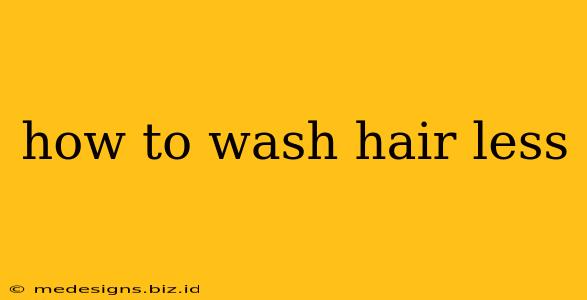Washing your hair less often might sound daunting, but it's a game-changer for healthier, happier hair. This guide will walk you through the process, addressing common concerns and helping you transition to a less frequent wash routine. Ultimately, you'll discover how to embrace your natural oils and achieve luscious, healthy locks.
Why Wash Your Hair Less?
Many of us are conditioned to think we need to wash our hair daily. However, frequent shampooing strips your scalp of its natural oils (sebum), leading to several problems:
- Dryness and Damage: Sebum acts as a natural conditioner, keeping your hair moisturized and protected. Over-washing removes this crucial protection, resulting in dry, brittle, and damaged hair.
- Increased Oil Production: Ironically, stripping away your natural oils can trigger your scalp to produce more oil to compensate, making your hair look greasy faster. This creates a vicious cycle of frequent washing.
- Scalp Irritation: Harsh shampoos and frequent washing can irritate your scalp, leading to dryness, itching, and even dandruff.
- Hair Loss: While not a direct cause, frequent washing can contribute to hair breakage and thinning, especially if you're already experiencing hair loss.
Transitioning to Less Frequent Washing: A Step-by-Step Guide
The key to successfully washing your hair less is a gradual transition. Jumping straight from daily washing to once a week can be shocking to your scalp and hair. Here's a plan:
1. Gradually Increase the Time Between Washes:
- Start with small changes: If you wash daily, try skipping a day. Then, gradually increase the time between washes by one day each week.
- Listen to your hair: Pay close attention to your hair and scalp. If you experience excessive oiliness or discomfort, adjust your schedule accordingly. There's no magic number; find what works best for your hair type.
2. Choose the Right Shampoo and Conditioner:
- Sulfate-free: Sulfates are harsh detergents that strip your hair of its natural oils. Opt for sulfate-free shampoos to be gentler on your scalp and hair.
- Clarifying Shampoo (Sparingly): Use a clarifying shampoo once a month or as needed to remove product buildup. Overuse can be drying.
- Conditioner is Key: Conditioner is crucial, especially when washing less often. Focus on the ends of your hair, avoiding the scalp to prevent oiliness.
3. Embrace Dry Shampoo:
Dry shampoo is your best friend during the transition. It absorbs excess oil and adds volume, keeping your hair looking fresh between washes. Apply it to your roots, focusing on areas that appear oily.
4. Other Helpful Techniques:
- Braiding or Updos: Styling your hair in braids or updos can help disguise oiliness and keep your hair looking neat.
- Hair Masks: Deep conditioning masks can help hydrate your hair and improve its overall health.
- Scalp Massages: Gently massaging your scalp can stimulate blood flow and promote healthy hair growth.
Maintaining Your New Routine
Once you've adjusted to washing your hair less frequently, maintaining your new routine is crucial. Remember:
- Listen to your hair and scalp: Your needs might change with the seasons or due to other factors. Adjust your washing schedule as needed.
- Stay consistent: The initial transition might be challenging, but stick with it. You'll see positive results over time.
- Be patient: It takes time for your scalp to adjust to producing less oil. Don't get discouraged if you experience some oiliness in the beginning.
Frequently Asked Questions (FAQs)
Q: How often should I wash my hair?
A: The ideal frequency depends on your hair type and lifestyle. Some people can go a week or more between washes, while others might need to wash every few days.
Q: What if my hair gets greasy quickly?
A: Try using a dry shampoo, focusing on the roots. You might also need to adjust your diet or consider a clarifying shampoo (sparingly).
Q: Will my hair smell bad if I wash it less often?
A: If you maintain good scalp hygiene and use a good quality shampoo and conditioner, your hair shouldn't smell bad.
Q: My hair feels really oily after a few days, what can I do?
A: Continue with your routine. Over time your scalp will adjust and produce less oil.
By following these steps and embracing a little patience, you can successfully wash your hair less often and enjoy healthier, more vibrant hair. Remember, your hair will thank you for it!
